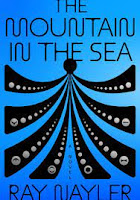First contact is an established sub-genre of science fiction. Humans arriving on an extra-terrestrial planet, chance meeting in space, or aliens arriving on Earth, innumerable such stories have been written in the century+ of sf. But what if the ”aliens” were with us all along? Such is the first question Ray Nayler's The Mountain in the Sea (2022) asks. The second it asks is: how would a fully corporate, technology-saturated world deal with that?
Set in a near-future of slightly altered national boundaries and nation states/business enterprises,The Mountain in the Sea is a braid of three character strands. First is Ha, a Vietnamese scientist who has been sent by her corp DIANIMA to a remote, heavily guarded Vietnamese island to do research. Specializing in marine biology, she finds herself in the company of the world's only sentient android investigating a strange underwater phenomenon involving octopode. Second is Rustem, a master hacker living under the radar in the Istanbul region. One of the world's best, he agrees to a hack job from an ultra rich but mysterious buyer, and ends up getting in over his head—almost. And lastly is Eiko, a slave worker aboard an AI captained fishing vessel called the Sea Wolf. Guarded by well-armed humans as the ship plies the South China seas, Eiko keeps his head down, waiting for his opportunity to escape.
The Mountain in the Sea is what a lot of readers would consider “proper science fiction”. With emphasis on story, action, and the interaction of ideas in a speculative environment, Nayler foregoes characterization, and to some degree scene, in telling his tale of a corporate world in conflict with nature. The humanity of the characters so lightly sketched, at times I truly wondered if Rustem was an android himself. Instead, he, Eiko, and Ha are the nodes which navigate the novel's conceptions. And there are some interesting ones.
The following themes appear in the novel: cages (metaphorical and physical), the challenges of large scale corporate power, communication/first contact, and drone and AI potential, though these latter technologies may in fact be more of a device. If I had to guess I would say Nayler wanted to emphasize the communication/first contact aspect, but the others form major sub-currents, and there is an argument to be made that large scale corporate power may in fact be the primary given the denouement.
Regardless of intent, a well-paced and dynamic plot synergizes these ideas, and is likely the reason the majority of readers will enjoy The Mountain in the Sea. While the two books are wildly different on most fronts, it reminds me of Ned Beauman's Venomous Lumpsucker. From protected species to corporate power, each author presents a near-future scenario that does not paint humanity's progress in the most altruistic of colors. But where Beauman goes for the morally gray conclusion, Nayler opts for the (semi-) Hallmark, something which feels good but in fact may distance the novel from relevancy or constructive feedback.
In the end, The Mountain in the Sea is an above average novel with pretensions for more. Mostly a thriller, the pages turn quickly at the speed of three characters' stories and the fact the science fiction eye candy is well done. The drone battles, the “alien” interaction, the AI, the slave fishing vessel—all will likely meet with strong approval from the core sf gods. The assumption is, however, Nayler tried to highlight certain theories for the enlightenment of readers. The success of this will depend on the reader. Moreover, stronger characterization, better scene setting, and a more ambiguous ending would have allowed the novel a chance at converting its pretensions into achievements. For readers of Ted Chiang's “Story of Your Life”, Ian Urbina's Outlaw Ocean, Ned Beauman's Venomous Lumpsucker, Neal Stephenson's Termination Shock, and pretty much anything by Bruce Sterling, The Mountain in the Sea is for you.


For a first novel, it's auspicious -- an achievement. But yeah, there are segments where the writing didn't make the grade: for me, the scene where Ha, Avrim, and whatever ancillary characters were present were supposedly spiritually transformed and elevated by the vision they have post-contact with the cephalopods was thuddingly flat.
ReplyDeleteThanks for the de facto recommendation for Urbina's book, which I hadn't been aware of
That was me, obviously.
ReplyDeleteAnd thank you Mark for the recommendation to read the book in the first place. I don't know if I would have otherwise. Agreed, for a debut it has enough substance to warrant checking out his next full-length effort.
Delete